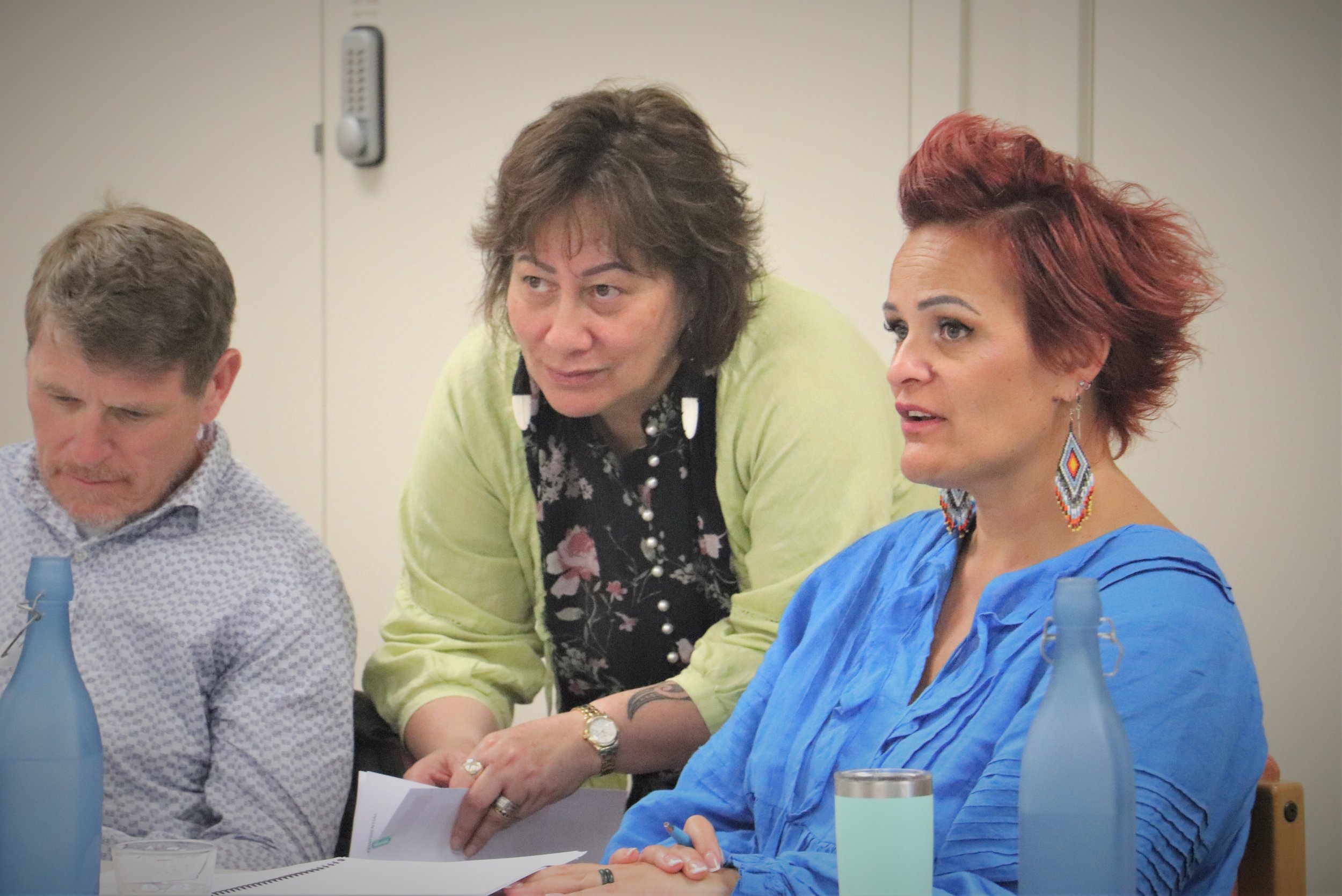From right: Ngareta Campion, a social worker based in Motueka photographed at a Te Pae Oranga Iwi Community Panel training hui with Teresa Ngaruhe, a Te Pae Oranga panel member.
Te Pae Oranga Iwi Community Panels are proving a powerful way of reducing re-offending and improving outcomes for Māori in contact with the justice system.
A 2019 evaluation showed that, at a national level, Te Pae Oranga reduced harm from re-offending by 22 per cent. In this article, we look at how the programme works in Te Tauihu o Te Waka-a-Māui.
Our role in remediation and reducing re-offending
Te Piki Oranga has partnered with New Zealand Police, under the principles of Te Tiriti o Waitangi, to provide the panels in the Te Tauihu rohe since August 2018.
The panels are an alternative to court for minor offending by people aged 17 years and older. They give community members a voice, involve victims in the remediation process and, with an average of 350 panel hearings each year, save police and court time.
How the panels work
Police refer people to Te Pae Oranga and provide panel members with the facts. The participant is asked to explain themselves and how they could repair the harm and prevent re-offending. The panel then works with all parties to decide remedial actions.
Our Te Pae Oranga facilitators ensure the participant has the chance to have any health and wellbeing needs addressed – these are often contributing factors.
A perspective from Te Piki Oranga
As Te Pae Oranga Kaikawe Kōrero (Co-ordinator), Betty Soane has been involved from the start. She describes the impact of Te Pae Oranga as providing second chances and freeing up the justice system.
“Our clients are forever telling me that they appreciate the panel listening to their stories, as they have never told them, and we are accepting and listen,” Ms Soane says.
An important part of Te Pae Oranga is mahi aroha, where participants give back to the community. This could be hunting, fishing or gardening for a community, carving and gifting an item, or making a donation to a charity.
“Most of our clients have not really achieved much and once they complete something like this they are very proud and come into the office to let us know, or call.”
Driving offences, often due to lack of a licence, are a good example of how Te Pae Oranga can make a difference.
“We will pay for them to sit their licence and to have driving lessons with our instructor, and ask the participant to make a donation to the Road Safety programme in return,” Ms Soane says.
“Driving licences are very important especially for our young māmā as they are able shop and take kids to doctors without looking over the shoulder for police.”
“Te Pae Oranga is about giving people a second chance and the opportunity to avoid a criminal record, if they complete the programme.
“We have had many successes, with our amazing panelists who can think outside the square and who have insights into participants’ lives,” Ms Soane says.
“The police have been amazing and are always ready to help. I believe the officers we had with us have changed their ways of thinking.”
Te Pae Oranga is for people of all ethnicities who benefit from a kaupapa Māori approach, says Ms Soane.
“We start with a mihi whakatau and karakia and let them know that is because we ‘start Māori and finish Māori’. This is a special kaupapa that I am proud to be a part of. It’s a real honour and privilege to be able to help people through these hard times and get them the results they need.”
Te Pae Oranga Liaison Officer Sergeant Dave Edwards and new panellists at a Te Pae Oranga training hui.
A perspective from Te Tauihu Police
Sergeant Dave Edwards is Te Pae Oranga Liaison Officer for the Whakatū / Nelson rohe. He has seen how the panel process can re-set the course of someone’s life.
“It’s common to see people not trust what’s happening, or they’re surprised when support is put on the table. They see that the people they’re talking to are specialists and not necessarily there to judge their actions at face value,” Sergeant Edwards says.
He emphasises that the panels provide holistic benefits.
"Everything we offer the participant can be offered to the victims as well, which can provide needed support.”
Sergeant Edwards also wants to correct any assumption that the panels are an easy way out for offenders.
“Participants are required to not only explain their situation, but also complete taskings and formally take accountability for the event that brought them before the panel. That can be difficult in front of three well-respected members of the community.
“Ultimately, they’re before the panels because the court wasn’t the right place for them in the first place. It’s great this pathway exists to deal with that, but that it also takes a good look at the support needed to prevent the situation happening again.”
This year, Sergeant Edwards intends to raise police staff awareness on how they can use the panels, to achieve increased referrals from the front line. His message for his colleagues is clear – to use their intuition.
“If your gut is telling you this person shouldn’t before the courts, or the event doesn’t warrant it – come and talk to me.”
Police, Te Piki Oranga kaimahi and panellists at a Te Pae Oranga Iwi Community Panel hui in November 2023.
““I cannot express how grateful we are to participate in Te Pae Oranga. I have witnesed the significant change in my son’s manner and ongoing wellbeing.””
““Thank you for treating me with respect and giving me a chance...sitting in handcuffs is something I never want to experience again.””
““The services and supports offered have not only helped me address the challenges I faced but have also empowered me to become a responsible and contributing member of society.””





